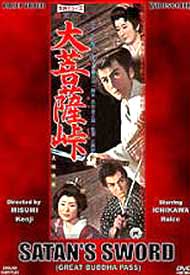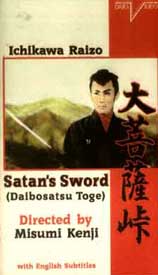 We are introduced to the character of Ryunosuke Tsukue (Raizo Ichikawa) strolling atop the Great Buddha Pass, as he calmly approaches a harmless old man, draws sword, cuts him down, & continues walking on his way. We are introduced to the character of Ryunosuke Tsukue (Raizo Ichikawa) strolling atop the Great Buddha Pass, as he calmly approaches a harmless old man, draws sword, cuts him down, & continues walking on his way.
So begins Satan's Sword (Daibosatsu toge, 1960), the first of a trilogy of films about a young samurai who kills for killing's sake in the same way misers accumulate money or tyrants power, needing no further justification for his pursuit.
The first of the triptych will already be familiar to many who have seen the much more widely circulated Sword of Doom (Daibosatsu toge, 1966) starring Tatsuya Nakadai. Nakadai plays Ryunosuke as definitively psychotic, but in Raizo's performance is some little possibility of redemption, whether or not that redemption is ever achieved.
In total the three films of the Satan's Sword Trilogy adheres more closely to Kaizan Nakazato's original serial novel more than does the Kihachi Okamoto film starring Nakadai, or the Tomo Uchida triptyche starring Chiezo Kataoka.
Assessing just Part I as as a separate film, as it compares to the same story filmed by Tomo Uchida, Kenji Misumi, & the stand-alone film by Kihachi Okamoto, I find the answer to "which one is best" largely a matter of taste.
If someone wants a less demonic Ryunosuke, then the films starring Cheizo Kataoka are best, though to me Chiezo's performance ranks third because he was afraid to portray the character in the full glory of his madness.
For my tastes, I find Okamoto's 1966 film to be the greatest in terms of an artistic achievement. It has what has got to be Tatsuya Nakadai's most disturbing performance of his entire career.
But Kenji Misumi takes the first third of the epic & keeps it very close to its literary source. Ryunosuke is one of the great purely nihilistic anti-heros of samurai fiction & cinema, & its nice to see a film version that so much respects the source material.
We soon learn that Ryunosuke is a master swordsman who runs by inheritance a famous fencing school founded by his father Danjo Tsukue (Chishu Ryu, well known from Ozu films). Danjo is ailing & bedridden & not apt to recover. He has detected a burgeoning cruelty in his son that he deplores, but Ryunosuke is indifferent to his father's opinion.
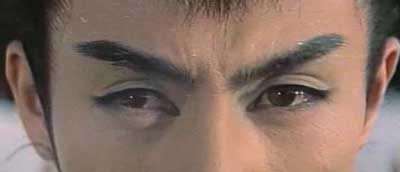 Ohama (Tamao Yamamoto) is the wife of another young swordmaster with whom Ryunosuke is slated to duel with bokken (wooden sword) in a contest that will decide who is most apt to become sword instructor to the daimyo's (lord's) family. Ohama (Tamao Yamamoto) is the wife of another young swordmaster with whom Ryunosuke is slated to duel with bokken (wooden sword) in a contest that will decide who is most apt to become sword instructor to the daimyo's (lord's) family.
Ohama knows only too well that Ryunosuke is the superior swordsman. Her husband's future hinges on success in this event, so she feels she must intervene lest her husband's defeat cause his school to fall into decline.
Ryunosuke implies he will throw the contest as she wishes, but only if she will give up something as dear to a woman as swordsmanship is to a man, namely her faithfulness to her husband. When she refuses, Ryonusuke forces his father's servant Yohachi to bring her to him in a mill, wherein rice is pounded vigorously as he rapes her.
In consequence of her humiliation, she is issued a writ of divorce by her unforgiving husband. Even supposing Ryunosuke was ever seriously willing to throw the contest in exchange for fulfiling his lust, there's now not going to be an opportunity for him to do so, as Ohama's husband is out for blood.
The judges quickly observe there is something wrong with both contestants, Bunnojo with true hatred flashing in his eyes, & Ryunosuke with a calm strange stance recognizable as deceptive & deadly "silent stance" that must inevitably kill Bunnojo.
The judges stop the proceedings quickly & declare a tie. But in fact Ryunosuke had in one blow crushed his opponent's forehead.
Denied a declaration of victory he leaves in a disgruntled mood, unconcerned that he just killed a man. Along the path Ohama arrives having just learned her husband was killed & that his students are hiding along the trail to avenge their sensei.
Ohama's declarations of devotion to Ryunosuke are a match for his own insanity. He has raped her, killed her husband, & irrevocably ruined her life. There is nothing for her now but to cling to the destroyer, while some part of her suppresses a desire for vengeance.
Our anti-hero is unconcerned with the ambush & continues on his way eager for the opportunity to kill more men. It's elegantly staged in the misty forest. Ryunosuke stands tall, slim, straight, & calm. His would-be slayers attack on all sides, & not a one of them ever had the slightest chance of survival.
Omatsu (Fujiko Yamamoto), a peasant girl, was the granddaughter of the old man Ryunosuke killed on Great Buddha Pass. She is desirous of revenge, & her uncle Shichibei had seen Ryunosuke on the path where her grandfather was killed. But he counsels his niece that only samurai pursue revenge, & she should not ponder such things.
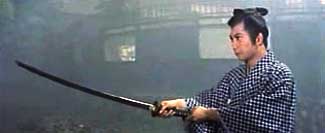 Her uncle is secretly a housebreaker who travels about the countryside conducting robberies. He would like to raise Omatsu himself, but his life is so much on the road. So she agrees to go with him to Edo where she has a maternal aunt. Her uncle is secretly a housebreaker who travels about the countryside conducting robberies. He would like to raise Omatsu himself, but his life is so much on the road. So she agrees to go with him to Edo where she has a maternal aunt.
Alas, upon arrival, they discover her aunt is an appalling woman who pretends to have no such relatives, while she focuses her attention on cuckholding her merchant husband.
Fortunately, a flower arrangement instructor, Okitsu, takes in Omatsu, as Okitsu has no family of her own. So by luck the girl needn't suffer further. Nevertheless Oyama's paternal uncle sets out to avenge his niece against the cruel aunt.
That night he breaks into the wicked woman's house & finds her in the arms of her lover. He ties them togther & drags them out into the street, where they're found & untied the next morning. Revealed as an adulteress, she & her lover are cast out of her husband's house & become beggars.
Due to the chaos & trouble he caused in his home village, Ryunosuke Tsukue too has arrived in Edo, with Ohama still a hanger-on & virtually his wife, soon to be mother of his son.
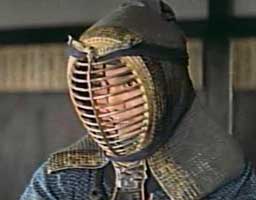 He changed his name to Ryutaro Yoshida because he's pursued by Hyoma Utsugi (Kojiro Hongo), younger brother of the man he killed in the contest with bokkens. He changed his name to Ryutaro Yoshida because he's pursued by Hyoma Utsugi (Kojiro Hongo), younger brother of the man he killed in the contest with bokkens.
Hyoma is undergoing training at a famous Edo dojo run by Toranosuke Shimada. Ryunosuke arrives one day at this dojo to test his skill against students of the famous sensei Shimada. As he & Hyoma never previously met, neither at first knows the identity of the other.
Hyoma is selected to stand against the challenger. Ryunosuke uses his Silent Stance to defeat the top student instantly, & if Shimada had not stepped in to block the force of the bokken's blow, Hyoma would've been killed.
Ryunosuke now claims his right to duel Shimada, but the sensei walks out of the hall without a word. When it becomes known that this was the man Hyoma has been seeking, Shimada warns the young man that the Silent Stance is not something he is as yet prepared to overcome. He's counselled to ponder the nature of the Silent Form, carefully plan his defense, & practice hard if he expects ever to defeat Ryunosuke.
When Ohama learns that her ex brother-in-law has honed in on Ryunosuke's whereabouts, she begs that Hyoma be spared, as he is young & will have a good life in front of him if Ryunosuke will just avoid him. But her common-law husband makes it clear he will not spare anyone who tries to kill him.
Ohama has never been quite normal since she was raped, torn between thinking of Ryunosuke as her enemy or her husband. Now she decides that life is too horrific & she tries to kill their infant child & herself.
Ryunosuke stops her from anything so rash. Agreeing at last it is not she who should die, she gets up in the night & draws a tanto (knife) from its sheath & lunges at the sleeping man. But he leaps up in full fury, chases her into the street, & impales her with his sword.
The next day the avenger Hyoma & Yohachi (the fellow who had formerly served Ryunosuke's father) find Hyoma's dead sister-in-law & an abandoned infant. Ryunosuke is gone.
Yohachi, guilt-ridden for having allowed himself to be frightened into contributing to Ohama's downfall, decides to adopt the infant Ikutaro, for Yohachi too had been an orphan. He'll return to the Great Buddha Pass & carve stone boddhisatvas for a living, trying his best to be a good foster father.
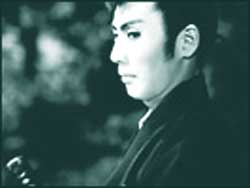 Though Ryunosuke kills without apparent pity, something deep within him must know guilt, for he has ferocious nightmares about the old man on Great Buddha Pass & other victims of his sword.
Though Ryunosuke kills without apparent pity, something deep within him must know guilt, for he has ferocious nightmares about the old man on Great Buddha Pass & other victims of his sword.
As played by Raizo this seems to indicate a buried conscious that only reaches him in his sleep. This compares to the character as played by Tatsuya Nakadai, where his nightmares seem merely part of his vicious & hallucinatory madness.
Raizo Ichikawa being at the height of his beauty gives Ryunosuke a spooky elegance, for he's a monster even though no one would recognize as one. He has found comrades among fellow ronin who've formed a society clalled Shinsengumi. He won't join Shinsengumi, but he hangs out with members, especially Serizawa (Jun Negami), & goes with members of the group on raids to assassinate enemies of the Shogun.
It is a time in history when the shogunate, after three centuries, is in rapid decline. Some of these characters like Shinsengumi's leader Kondo Isamu (Senji Sugawara) & Serizawa & Hijikata are entirely historical, & their deeds were not all that different than portrayed in this film.
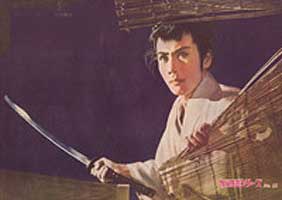 Shinsengumi consists of violent young men, many ex-peasants, who've become samurai with shogunate approval since they have joined together to defend the failing bakufu government. They can be awfully careless about who they target, which suits Ryunosuke fine since he is not committed to the politics of the day, but only to the joy of killing. Shinsengumi consists of violent young men, many ex-peasants, who've become samurai with shogunate approval since they have joined together to defend the failing bakufu government. They can be awfully careless about who they target, which suits Ryunosuke fine since he is not committed to the politics of the day, but only to the joy of killing.
A day comes when Shinsengumi's sloppiness backfires on themselves. Serizawa has selected a few men for the raid. They waylay a palanquin but the man they expected to assassinate is not in it. Instead, they have attacked Edo's premiere sword instructor, the very Shimada who had refused a contest with Ryunosuke.
If Ryunosuke ever believed Shimada evaded that duel because of the mightiness of the Silent Stance, he's soon disabused of any such sentiment. Shimada angrily demands to know why these men want his life. As they attack without reply, he carves through all them with commanding ease.
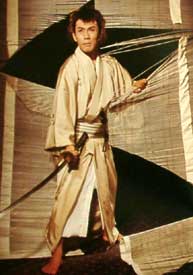 Ryunosuke, usually at the forefront of murderous events, has for once stood back observing Shimada with a kind of star-struck awe, as he has never seen such skill, never imagined there was a level of ability greater than his own. Ryunosuke, usually at the forefront of murderous events, has for once stood back observing Shimada with a kind of star-struck awe, as he has never seen such skill, never imagined there was a level of ability greater than his own.
That one-against-all battle on the snow-covered thoroughfare is one of the visual centerpieces of Satan's Sword, a beautiful piece of action in a beautiful setting beautifully choreographed (& hard to believe Kihachi Okamoto could have improved upon it for Sword of Doom but he certainly did so).
Very nearly everyone fell that day, but Serizawa begs forgiveness, admitting to a very great error as Shimada criticizes him for causing all this unecessary death.
And because Ryunosuke did not attack Shimada, he too survives. But Shimada recognizes who stands at the fringe of the action, & warns him that his current path is not the road to perfect swordsmanship. "To study the sword, first study the soul."
Ryunosuke for the first time in his life is moved, perhaps only in the manner by which an alpha dog submits to a stronger alpha dog.
A great deal more is told of the life of the young peasant girl Omatsu. Very little of it has anything to do with the primary story track, except that none of it would've happened to her if Ryunosuke hadn't killed her grandfather.
It is interesting stuff in & of itself, but as regards her ongoing connection to Ryunosuke, the most significant part of her story is the chemistry that occurs between her & Hyoma, Ryunosuke's young enemy. In the serial novels there is much less a tendency to focus so much on Ryunosuke & many side-stories can be told.
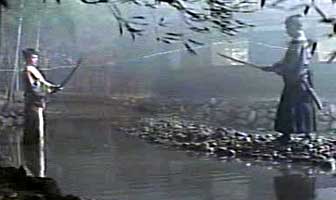 It's the major concession to cinematic narrative technique to make him the singular protagonist & heighten the enmity between him & Hymoa, who like Ryunosuke has become chummy with members of Shinsengumi, in particular with Hijikata. It's the major concession to cinematic narrative technique to make him the singular protagonist & heighten the enmity between him & Hymoa, who like Ryunosuke has become chummy with members of Shinsengumi, in particular with Hijikata.
Ryunosuke is manipulated back & forth by members of Shinsengumi. Serizawa wants Ryunosuke to kill the organization's leader Kondo so Serizawa can take over Shensen Group. Hijikata wants Hyoma to kill Ryunosuke over his failure to fight the day many men fell against the sword of Shimada.
Ryunosuke is warned of the plot against his own life, but the only thing he fears are his own hallucinations. He has been drinking long into the night, with Omatsu in the room observing his strange behavior. In what becomes another of the great scenes in the whole epic, Ryunosuke begins to detect ghosts all round him, of Omatsu's grandfather, of his common-law wife Ohama.
He begins dueling the shadows of his own guilt, cutting through the walls of the room, cutting up bamboo curtains, then tumbles into the garden completely out of his mind. Hyoma Utsugi arrives encouraged by Hijikata. The scene fades on the cliffhanger of Ryunosuke's insanity, Hyoma & members of Shinsengumi pursuing him across a garden pond & out into the forest.
copyright © by Paghat the Ratgirl
|

